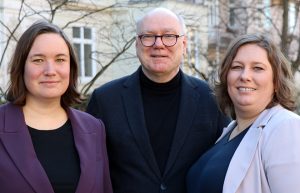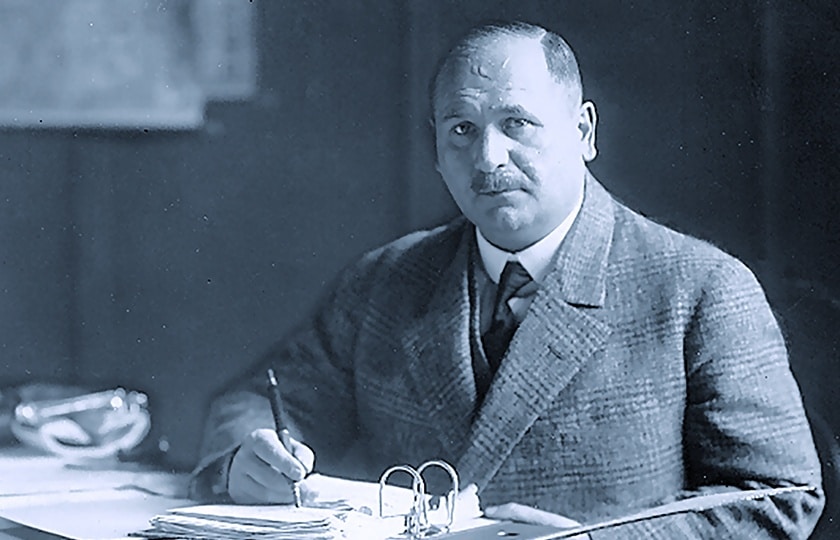The Leibniz Institute for Media Research │Hans-Bredow-Institut (HBI) was founded in 1950 by the public broadcaster Nordwestdeutscher Rundfunk (NWDR) and Universität Hamburg as a foundation under civil law with legal capacity. The institute has been a member of the Leibniz Association since 2019.
Bodies of the Institute
As a legally responsible foundation, the Institute has four bodies according to its statue: The Curatorship, the Directorate, the Institute Council and the Scientific Advisory Council.
Curatorship
The Curatorship serves as the supervisory body of the Leibniz Institute for Media Research | Hans-Bredow-Institut; its constituent meeting took place on 15 March 2019. The curatorship advises the Directorate and supervises its management as well as the preservation of the foundation’s purpose. It has a comprehensive right to information.
- State Secretary Dr. Eva Gümbel (Chair), Ministry of Science, Research and Equality in Hamburg
- Christian Herbst (Vice Chair), Federal Ministry of Research, Technology and Space
- Meike Dorner, at the Federal Government Commissioner for Culture and the Media (BKM)
- Prof. Dr. Hauke Heekeren, Universität Hamburg
- Dr. Michael Kühn, Norddeutscher Rundfunk
- Dr. Florian Kumb, Zweites Deutsches Fernsehen
- Christian Mihr, Reporters Without Borders
- Dr. Claas Schüddekopf, Ministry of Culture and Media in Hamburg
- Eva Sommer, Medienanstalt Hamburg/Schleswig-Holstein
Board of Directors
The Institute is managed and legally represented by the Executive Board, which currently consists of three members who represent the research perspectives of the Institute and the commercial management.
The Executive Board consists of the Managing Director, Dipl.-Kffr. Kristina Hein, the Scientific Director, Prof. Dr. Judith Möller, and the Scientific Director, Prof. Dr. Wolfgang Schulz (chair). The Executive Board determines the research planning. The Scientific Directors are appointed by the Curatorship for a term of five years.
In the picture from left to right: Prof. Dr. Judith Möller, Prof. Dr. Wolfgang Schulz and Dipl.-Kffr. Kristina Hein

Institute Council
In the performance of its duties, the Board of Directors is supported by the Institute Council, which includes the Board of Directors itself, the scientific speakers as well as other representatives of the scientific and non-scientific staff.
Speaker: Dr. Claudia Lampert, Vice-Speaker: Julius Reimer
Scientific Advisory Council
The international Scientific Advisory Council advises the Institute’s Board of Directors on scientific work and strategic issues. The members of the Scientific Advisory Council are:
- Prof. Dr. Helena Bilandzic, Professor of Communication Sciences with focus on Media Reception and Media Effects at the University of Augsburg
- Prof. Dr. Margreth Lünenborg, Institute for Media and Communication Studies at Freie Universität Berlin
- Prof. Dr. Boris P. Paal, M.Jur. (Oxford) (Vice Chair), Chair for Law and Regulation of the Digital Transformation at TUM School of Social Sciences and Technology in Munich
- Prof. Dr. Manuel Puppis (Chair), Professor of Media Systems and Media Structures at the Departement of Communication and Media Research DCM at Universitét de Fribourg, Switzerland
- Prof. Dr. Gabriele Siegert, Professor of Media Economics & Management at the Department of Communication and Media Research at the University of Zurich and Vice President for Education and Student Affairs, University of Zurich, Switzerland
- Prof. Dr. Florent Thouvenin, Professor für Informations- und Kommunikationsrecht an der Universität Zürich
Representatives
- Data Protection Officer: Jennifer Jähn-Nguyen, datenschutz nord GmbH
- Equal Opportunities Officers: Katharina Mosene, Julia Prütz, Verena Albert
- Ombudspersons: Prof. Dr. Margarete Schuler-Harms, Prof. Dr. Michel Clement
Works Council
- Chairman: Cindy Hesse
- Deputy Chairman:Dr. Hans-Ulrich Wagner,
- Additional Members: Dr. Leonie Alatassi, PD Dr. Jan-Hinrik Schmidt, Erik Pfeiffer
Financing
The Leibniz Institute for Media Research │Hans-Bredow-Institut (HBI) is a foundation without endowment capital, which pursues exclusively charitable purposes and makes no profits.
Since it was admitted to the Leibniz Association in 2019, the Institute has been funded on a pro rata basis by the Federal Ministry of Education and Research (BMBF) and by the joint research funding of the Länder, represented by the Ministry of Science, Research and Equal Opportunities and Districts (BWFGB) of the Free and Hanseatic City of Hamburg.
In addition, there are other grants and donations as well as revenues from third-party funded projects and publishing products. As a non-profit foundation, the Institute is able to issue donation receipts.
Overall Budget 2022
The total budget in 2022 amounted to € 5,530,891.30, which was made up of € 2,012,000.00 in institutional funding from the Free and Hanseatic City of Hamburg, € 526,751.60 in special funding from the Hamburg Ministry of Science, Research and Equality (BWFG), € 443,864.22 in other grants and donations (NDR Media, Medienstiftung Hamburg, ZDF), € 2,493,366.94 in third-party funding and € 54,908.54 in other income.
Third-party funders 2020-2022
In the years 2020-2022, third-party funding came from the following institutions:
- the Federal Government Commissioner for Culture and the Media BKM; the Federal Ministry of Education and Research (BMBF); the German Research Foundation (DFG); the European Commission, EU Horizon 2020; the European Cooperation in Science and Technology; the Leibniz Association (Leibniz Competition Cooperative Excellence and Leibniz Research Alliance “Value of the Past”); State Chancellery of Rhineland-Palatinate; Federal Agency for Civic Education (BPB); State Agency for Civic Education Mecklenburg-Western Pomerania (LpB MV);
- foundations (AvH Philipp Schwartz Initiative of the Alexander von Humboldt Foundation; Carlsberg Foundation; Deutsche Telekom Stiftung; FNF – Friedrich Naumann Stiftung; reset.tech; Stiftung digitale Chancen; Stiftung Mercator, VolkswagenStiftung; Zeit Stiftung);
- broadcasting and media institutions (Mitteldeutscher Rundfunk MDR; Norddeutscher Rundfunk (NDR); Landesanstalt für Medien NRW – LfM; Niedersächsische Landesmedienanstalt (NLM); Zweites Deutsches Fernsehen (ZDF)
- and others (Alexander von Humboldt Institut für Internet und Gesellschaft – HIIG; Bayerisches Forschungsinstitut für digitale Transformation (bidt) der Bayerischen Akademie der Wissenschaften; Deutsche Gesellschaft für Publizistik- und Kommunikationswissenschaft (DGPuK); Deutsche Presse-Agentur (dpa)/#UseTheNews gGmbH; Deutsche UNESCO-Kommission; Exzellenzcluster „Die Herausbildung normative Ordnungen“ an der Universität Frankfurt; Freiwillige Selbstkontrolle Multimedia-Diensteanbieter (FSM e. V.); JFF – Jugend Film Fernsehen e.V.; Karlsruher Institut für Technologie (KIT); Medienpädagogischer Forschungsverbund Südwest (mpfs); Unicef Innocenti; Verband der Ersatzkassen e. V. (vdek); Zentrum für Zeithistorische Forschung Potsdam LFV HA(ZFF)).
The largest share of the Institute’s expenditure consists of personnel costs. Due to increased funding from the City of Hamburg, the staffing plan has been expanded somewhat in recent years in order to open up new fields of research.
History
The Hans-Bredow-Institut was founded on 30 May 1950 by the Nordwestdeutscher Rundfunk [Northwest German Broadcasting Corporation] (NWDR) and Universität Hamburg as a foundation under civil law with legal capacity. The Institute was named after Hans Bredow (1879-1959), State Secretary and Commissioner for Broadcasting in the Ministry of Posts in the Weimar Republic, who made a name for himself in the Weimar Republic as a pioneer of the technical development of broadcasting. He was awarded the Knight Commander’s Cross of the Order of Merit in 1954 for his services in establishing the organisational structures of broadcasting in the Federal Republic.
Since 2019, the institute has been a member of the Leibniz Association under the new name Leibniz Institute for Media Research │ Hans-Bredow-Institut (HBI).
More information about the history of the institute, which celebrated its 75th anniversary in June 2025, can be found here.




